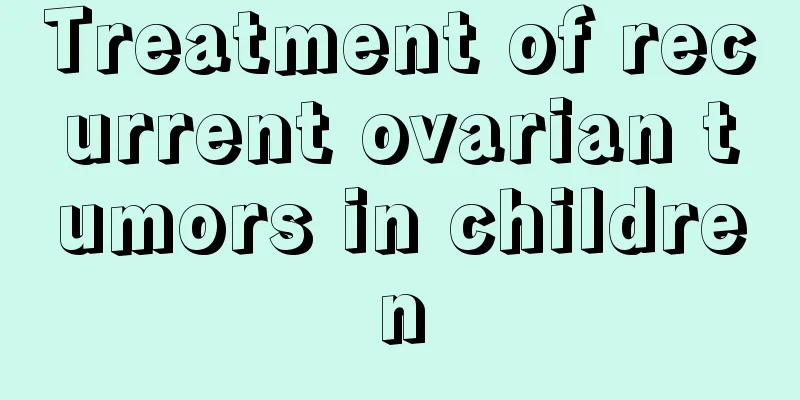What should you pay attention to before treatment of esophageal cancer?

|
In recent years, esophageal cancer has become one of the major diseases that endanger people's health. Its causes are diverse. Preventing the occurrence of esophageal cancer is undoubtedly the most fundamental measure to control esophageal cancer. According to the multi-stage development of esophageal cancer, namely the initiation, promotion, and evolution stages, we start from the perspectives of etiology, pathogenesis, and clinical medicine evolution. Primary prevention Primary prevention, namely etiological prevention, is the fundamental way to reduce the incidence of esophageal cancer. It is closely related to the progress of epidemiological and etiological research. It is the most ideal method, but it is very difficult and is currently difficult to carry out comprehensively. (1) Change the habit of eating moldy food: There is sufficient evidence that eating moldy food, especially sauerkraut, moldy steamed bread and fish sauce, is one of the important factors for the development of esophageal cancer. Therefore, we should vigorously publicize the harm of such food to human health so that people can eat less or no food. At the same time, we should encourage the planting of vegetables and fruits to increase the intake of fresh vegetables and fruits and supplement vitamin C. Moldy food, on the one hand, produces mycotoxins or metabolites, and on the other hand, promotes the internal synthesis of nitrosamines, which is the main cause of esophageal cancer. Eating more fresh vegetables or supplementing vitamin C can block the synthesis of nitrosamines in the body and reduce the nitrosamine content in the stomach, thereby reducing the exposure level of nitrosamines in the stomach. In addition, a nutritional prevention trial in Lin County found that supplementing riboflavin and niacin can reduce the incidence of esophageal cancer by 15%. At the same time, we should also actively study scientific methods for making and preserving sauerkraut to meet the traditional eating habits of local residents that have been cultivated for generations. Change bad eating habits, do not eat moldy food, eat less or no pickled cabbage. Improve water quality and reduce the nitrite content in drinking water. Promote the use of trace element fertilizers and correct the lack of trace elements such as molybdenum in the soil. Use Chinese and Western medicines and vitamin B2 to treat esophageal epithelial hyperplasia to block the carcinogenesis process. Actively treat esophagitis, esophageal leukoplakia, achalasia, esophageal diverticulum and other diseases related to esophageal cancer. Monitor susceptible populations, popularize cancer prevention knowledge, and raise cancer prevention awareness. (2) Grain mold prevention: Moldy grain contains a variety of carcinogenic toxins, so it is very important to actively carry out grain mold prevention and detoxification work, especially to publicize the importance of mold prevention for household grain storage. Generally, grains with a moisture content below 13% can meet the mold prevention requirements. Once the grain is found to be moldy, it should be frequently exposed to the sun, picked out before eating, washed several times and treated with alkali to effectively reduce the intake of mycotoxins. (3) Strengthen the sanitation management of drinking water: It has been found that the nitrosamine content in water in areas with a high incidence of esophageal cancer is significantly higher than that in areas with a low incidence. Therefore, it is very important to maintain good environmental hygiene and prevent water pollution. Gradually reduce the number of areas where people drink ditch and pond water and promote the use of tap water. Ditch and pond water for drinking should also be disinfected with bleaching powder, which can significantly reduce the nitrosamine content in the water and kill other infectious bacteria. (4) Prevention of genetic pathogenic factors: Esophageal cancer has a common family clustering phenomenon, indicating that the susceptibility to cancer in people with a family history of esophageal cancer does exist, and the monitoring of the same generation should be strengthened. If the patient is male, male monitoring should be strengthened, especially those under the age of 49. If the patient is female, female monitoring should be strengthened, especially those aged 50 to 69. Families with two or more deaths from esophageal cancer in three generations should be considered as dangerous families, and members aged 40 to 69 in these families should be considered as risk groups. Regular physical examinations, provision of preventive drugs or vitamins, and persuasion to change lifestyle habits, etc., have a certain positive significance in reducing the incidence of esophageal cancer. Secondary prevention: It is impossible to completely achieve primary prevention for esophageal cancer at present. Since esophageal cancer takes a long time to develop, early detection, early diagnosis and timely treatment, especially blocking the further development of precancerous lesions, are currently feasible methods of tumor prevention. (1) Survey: Patients aged 35 or above in high-incidence areas with a family history of esophageal cancer or esophageal epithelial hyperplasia are identified as high-risk groups and are monitored as a priority. In addition, residents aged 35 or above in high-incidence areas of esophageal cancer are screened as much as possible. The survey is mainly based on esophageal cytology. If a suspicious patient is found, an endoscopic examination should be performed as soon as possible to achieve the purpose of early diagnosis. The early manifestations of esophageal cancer, such as "swallowing discomfort", should be made known to the general public in high-incidence areas, so that patients can seek medical treatment earlier for early diagnosis and treatment. (2) Drug prevention of precancerous lesions: Precancerous lesions of esophageal cancer mainly refer to severe hyperplasia of the esophageal epithelium. The canceration rate in the untreated group was 7.4%. The canceration rate in the treated group was significantly different from that in the untreated group, and more patients recovered to normal. The above is some of the content I introduced to you about "What should I pay attention to before the treatment of esophageal cancer?" I hope it will be helpful to you. Once you find any abnormal symptoms, you should go to the hospital in time to avoid delaying the disease. If you have other questions about esophageal cancer, please consult an online doctor for answers. Feihua Health Network is always by your side and cares about your health! Esophageal cancer http://www..com.cn/zhongliu/sda/ |
<<: What diseases can esophageal cancer be easily confused with?
>>: What are the early symptoms of esophageal cancer?
Recommend
Effects of drug residues on the fetus after recovery from colorectal cancer
In fact, a disease like colorectal cancer is a ve...
How to treat high urine protein, people need to pay attention
Nowadays, people don’t know why they will have va...
What are the symptoms before death of patients with advanced liver cancer?
What are the symptoms before death of patients wi...
How many hours of normal sleep do you get every day
Healthy sleep is very important for our body. If ...
Can early gastric cancer be cured?
Can early gastric cancer be cured? Early gastric ...
Beware of the "three livers", they are close relatives of liver cancer!
The liver is the "headquarters" of the ...
How much does it cost to treat prostate cancer
How much does it cost to treat prostate cancer? P...
Maintenance of mink coat
Mink coat is a common type of elegant and luxurio...
How to solve a nightmare
Many people are often troubled by nightmares beca...
What are the symptoms of gastric perforation? It turns out there are four types
Speaking of gastric perforation, a stomach diseas...
What are some teas that nourish the stomach and strengthen the spleen?
There are many ways to nourish the stomach and st...
What should I do if I have upper ureteral stones on the right side?
Right upper ureteral stones are a common urinary ...
Introduction to the sequelae of overbite correction
In life, especially many young friends are in the...
Early symptoms of breast cancer
Early symptoms of breast cancer: When a woman has...
What's wrong with the lump of meat under my armpit?
There is a lump of flesh under the armpit, which ...









